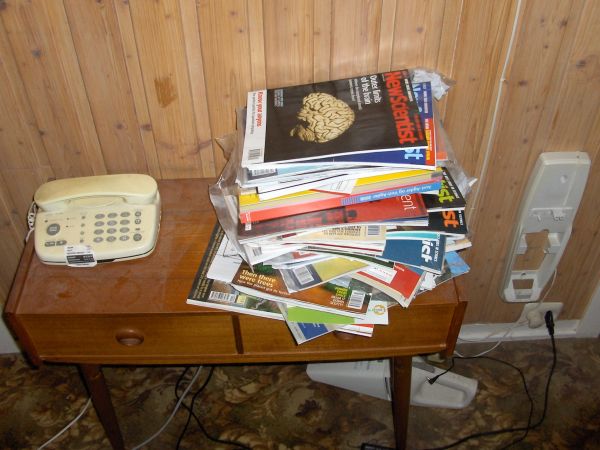
New Scientist clutter creep.
I have been thinking back to how my old apartment looked the last years I lived there. It is not that bad here, but the lack of storage rooms (these are still used by the landlord) made it necessary to crowd a couple rooms (bedroom and home office) with ugly stuff like bags and boxes full of various objects. And then there is the clutter creep of popular science magazines, the occasional new CD from Japan, and a couple new computers each year. As the clutter creep advances, it will become harder to keep things reasonably clean, and eventually to find things.
Thinking about this on my way home from work, I came up with what I call the Pigsty Project. Despite the name, the purpose is to reduce the pigsty rating of my home. It is a very modest approach, because grand plans never even start, when I am involved.
Basically, each workday as I return from work, I will throw something away. (Unless I have already done so in the morning, but that is probably not likely, since I am barely conscious in the morning.) It need not be a big thing. It is the fact that there are 200 workdays a year I plan to capitalize on.
Today, I threw away a stack of New Scientist from last year. As I looked on them, each had at least one really interesting article that I just knew I wanted to read again someday. Unfortunately, I also knew that there are only 7 days in a week, and none of them is named Someday. Decades of observing and journaling my life has taught me that no matter how much I love a scientific article, I am not going to read it again – even over the course of a decade or more – until I have to throw it away.
This is consistent with the behavior I observed for many years in my workplace: When given new written information, filing it in a binder served as an alternative to reading it. When given information over e-mail, the procedure was expanded to printing out the mail and putting it in a binder instead of reading it. The binder was never opened again, except to put in more pages. Then when it was full, it was left to gather dust.
I am sorry, New Scientist. But that’s the way it goes. At least I stopped subscribing after one year, and will probably continue that way until they offer online-only subscriptions like The Economist does, where I can access the archives for an acceptable monthly sum without having trees killed and laid on my doorstep as by a vegetarian cat.
One other thing I did today, to prepare for the future, was make a new folder on my almost empty D: drive, named “My old CDs”. So yeah, one of the alternatives I can do when I come home from work is to rip one of the CDs from the plastic bags that have stood around since I moved, and before that stood around for years in the Chaos Node. Each day, unless I find something else worthy of killing, one of the oldest CDs will be ripped to MP3 or some such (FLAC would probably be overkill) and then the physical CD and cover destroyed.
Actually it would probably make more sense to drop it on a bench in the city (instead of destroying it), but that would be piracy, yes?
Now it just remains to remember it each day. Lacking any other enforcement, I can only trust the Invisible Hand to click on me each day as I return from work and select “Unclutter” from the menu. It seems like something the Invisible Hand would happily do. Perhaps even gleefully…
